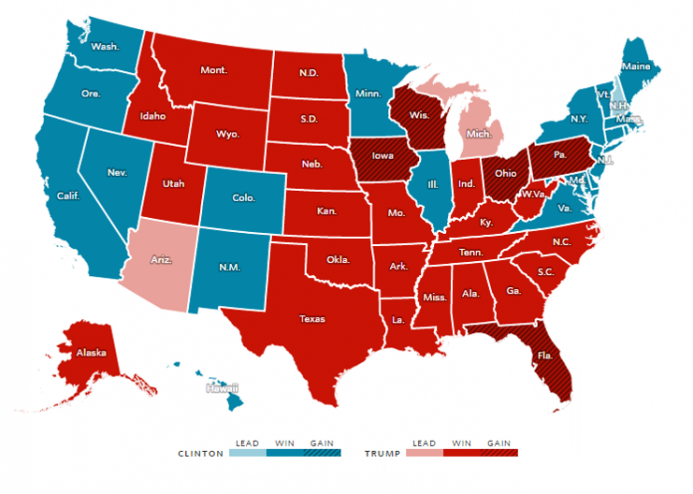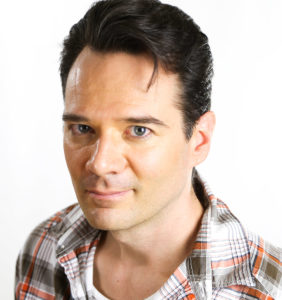Russian Collusion? – Article by Mollie Hemingway

This essay is reprinted by permission from Imprimis, a publication of Hillsdale College.
The following is adapted from a speech delivered on September 7, 2017, at Hillsdale College’s Allan P. Kirby, Jr. Center for Constitutional Studies and Citizenship in Washington, D.C.
We keep being told that President Trump is not normal. This much has been blindingly obvious. He had never run for office or otherwise served in a public capacity. He has been accused, not without reason, of breaking all manner of political norms. America’s most nontraditional president was never going to conduct business as usual from the West Wing. Less than a year into his first term, he has already caused much anguish in Washington. This should be no surprise—while running for office Trump repeatedly promised to “drain the swamp” and shake things up. Americans knew who they were voting for, and history will judge the results.
That said, Trump’s nascent presidency has coincided with perhaps the greatest violation of political norms this country has ever seen—a violation that has nothing to do with Trump’s behavior. Since the election last November, there has been a sustained, coordinated attack on Trump’s legitimacy as president following his victory in a free and fair election. This has the potential to cause far more lasting damage to America than Trump’s controversial style.
Democratic operatives and their media allies attempted to explain Trump’s victory with a claim they had failed to make stick during the general election: Trump had nefarious ties to Russia. This was a fertile area for allegations, if for no other reason than that Trump had been reluctant to express criticism of Russian President Vladimir Putin. By contrast, Secretary of State Hillary Clinton repeatedly condemned Russia’s 2011 elections, saying they were “neither free nor fair” and expressing “serious concerns” about them. She publicly called for a full investigation while meeting with top Russian officials. This made Putin livid. “Mr. Putin said that hundreds of millions of dollars in ‘foreign money’ was being used to influence Russian politics, and that Mrs. Clinton had personally spurred protesters to action,” The New York Times reported.
Trump’s relationship with Putin was decidedly different. In December 2015, Putin called Trump “a really brilliant and talented person.” Trump replied: “It is always a great honor to be so nicely complimented by a man so highly respected within his own country and beyond.” He added, “I have always felt that Russia and the United States should be able to work well with each other towards defeating terrorism and restoring world peace, not to mention trade and all of the other benefits derived from mutual respect.”
Then rumors surfaced in the summer of 2016 that Russia probably had something to do with the alleged hack of the Democratic National Committee email system, as well as the successful “phishing” of Democratic insider John Podesta’s inbox. Russia was also alleged to have tried to hack the Republican National Committee, but without success. It remained an open question whether the Russians were trying to help Trump or were simply trying to create chaos in the election. Regardless, these Democratic Party emails were published by WikiLeaks, and they confirmed what many critics had said about Clinton and the DNC—the DNC had engineered the primary to ensure a Clinton victory; the Clinton campaign had cozy, borderline unethical relations with members of the mainstream media; Clinton expressed private positions to Wall Street banks that were at odds with her public positions; and various other embarrassing details indicating her campaign was in disarray.
According to Shattered, a well-sourced book about the Clinton campaign written by sympathetic reporters, Clinton settled on a Russia excuse within twenty-four hours of her concession speech. [Campaign manager Robby] Mook and Podesta assembled her communications team at the Brooklyn headquarters to engineer the case that the election wasn’t entirely on the up-and-up. For a couple of hours, with Shake Shack containers littering the room, they went over the script they would pitch to the press and the public. Already, Russian hacking was the centerpiece of the argument.
The Russian collusion story involves a lot of details, but there are two basic tactics that Trump’s enemies have used to push the narrative: they have put seemingly innocuous contacts with Russians under a microscope, and they have selectively touted details supplied by a politicized intelligence apparatus. And this has all been amplified by a media that has lost perspective and refuses to be impartial, much less accurate.
Meetings with Russians
If most of us can now agree that Putin’s Russia is a potential threat to the United States, we shouldn’t forget that the Washington establishment regarded this as a radical opinion not so long ago. Shortly after President Obama was elected in 2008, Time magazine ran a cover with him asking a Russian bear, “Can we be friends?” The media generally celebrated Secretary of State Clinton’s attempt at a Russian “reset” in 2009. Obama was later caught on a hot mic promising Putin more “flexibility” once he was reelected. And during Obama’s reelection campaign in 2012, when his opponent Mitt Romney characterized Russia as our greatest geopolitical foe, Obama mocked him by saying, “The 1980s called. They want their foreign policy back.” The New York Times editorial page said of Romney’s Russia comments that they “display either a shocking lack of knowledge about international affairs or just craven politics. Either way, they are reckless and unworthy of a major presidential contender.”
Trump’s election changed all that. Not since the heyday of McCarthyism in the 1950s have so many in Washington been accused of consorting with Russians who wish to undermine American democracy.
The Washington Post reported in mid-January that Mike Flynn, Trump’s incoming National Security Advisor, had spoken via telephone with Russian ambassador Sergey Kislyak on December 29, the day the Obama administration announced the expulsion of 35 Russian officials in retaliation for the DNC hacking. Although such conversations are perfectly legal, the Postsuggested, quite incredibly, that Flynn might have violated the Logan Act, which bars U.S. citizens from correspondence intending to influence a foreign government about “disputes” with the United States. The Logan Act, which has a long record of being cited by cranks, has not been enforced since it was passed (in 1799!) because it is widely considered to be grossly unconstitutional. In addition to the Post, The New York Times, Foreign Policymagazine, and other outlets credulously repeated the same ludicrous talking point about Logan Act violations.
Let it also be noted that Flynn, while a critic of Russia and of the Iran nuclear deal that Russia helped put together, also was paid to speak at a dinner hosted by the Russian TV network Russia Today.
When then-Senator Jeff Sessions was asked, during his confirmation hearing to be U.S Attorney General, about allegations of Russian attempts to compromise the Trump campaign, he noted that he had been a Trump surrogate and hadn’t heard of any meetings for this purpose. When it turned out Sessions had met with Kislyak in a different capacity—as a U.S. Senator on the Armed Services Committee—the ensuing uproar in the media led him to recuse himself from any investigation into Russian meddling. Of course, it was Kislyak’s job to facilitate as many meetings as possible with top officials across the political spectrum, and he was seen at meetings with House Minority Leader Nancy Pelosi and Senator Claire McCaskill, two prominent Democrats, as well as other Republicans. Indeed, such meetings between foreign ambassadors and U.S. elected officials are routine.
It’s true that Trump was associated with people who had ties to Russians. His former campaign manager Paul Manafort had previously done political consulting work in Ukraine for Russia-aligned groups. Carter Page, a foreign policy advisor with a limited role, is a Naval Academy graduate, businessman, and academic who has been open about his belief that America’s anti-Russian foreign policy has been counterproductive. And Roger Stone, a campaign advisor with a reputation for outlandish campaign work, reportedly spoke with WikiLeaks founder Julian Assange as well as Guccifer 2.0, who may be a Russian hacker.
But perhaps no meeting attracted as much scrutiny as one in June 2016 between Donald Trump, Jr., Paul Manafort, Jared Kushner, and various Russians, including a Russian lawyer. According to email correspondence, the Trump associates were told they would receive opposition research on Clinton that may have been provided by the Russian government. No research was handed over, but critics said that the language in the emails supported claims of attempted collusion. After weeks of accusations, the story quickly ran out of steam when it was revealed that the Russian lawyer, who was to have provided the information, had employed a shadowy opposition research firm known as Fusion GPS—a business that had strong ties to Democratic interests, had previously tried to smear Mitt Romney donors and critics of Planned Parenthood, and had played a key role in a recent and infamous attempt to smear Trump.
Politicized Intelligence
Many allegations concerning Russia have been taken seriously based solely on the institutional credibility of the accusers. It appears that members of America’s intelligence community are some of the President’s most passionate opponents.
Late last December, the Department of Homeland Security and the FBI put out a 13-page report touted as definitive proof of Russian state involvement in the DNC server hack and the phishing attack on John Podesta’s emails. It was remarkably paltry—vague and non-specific in a way that really didn’t help clarify the precise nature of Russia’s involvement. Cyberwarfare expert Jeffrey Carr wrote that the report “adds nothing to the call for evidence that the Russian government was responsible” for the hacks. It listed every threat ever reported by a commercial cybersecurity company that was suspected of having a Russian origin, Carr noted, lumping them under the heading of Russian Intelligence Services, without providing any supporting evidence that such a connection existed. Former Air Force cyberwarfare officer Robert Lee said the report was of limited use to security professionals, in part because of poor organization and a lack of crucial details.
Senior intelligence appointees tried again in early January, with a report from the Office of the Director of National Intelligence. It was also lacking in specifics. But comments from high profile Democrats, supported by a leak campaign to media outlets, did have an effect. By late December, more than half of Democrats believed—despite the lack of evidence—that “Russia tampered with vote tallies in order to get Donald Trump elected President,” according to a YouGov.com poll.
When Trump responded to these reports with dismissals and a few begrudging admissions of minor contacts with Russians, critics gleefully warned him that partisans at intelligence agencies would retaliate. Senate Minority Leader Chuck Schumer (D-NY) said, “Let me tell you, you take on the intelligence community, they have six ways from Sunday at getting back at you. So even for a practical, supposedly hard-nosed businessman, he’s being really dumb to do this.” Former George W. Bush speechwriter and current never-Trump activist David Frum echoed this sentiment: “CIA message to Trump: you mess with us, get ready for a leakstorm of Biblical proportions.” Essentially, intelligence agencies were being publicly encouraged to abuse their power to stop Trump before he had even assumed office.
In January, the big story dropped. “Intel chiefs presented Trump with claims of Russian efforts to compromise him,” blared the headline from CNN. According to highly placed anonymous sources, top intelligence appointees had informed Obama, Vice President Joe Biden, and Trump that “Russian operatives claim to have compromising personal and financial information about Mr. Trump.” A former British intelligence operative had compiled a damaging “dossier” on the President-elect. CNN reported that intelligence officials considered this operative’s past work credible. But he had paid his Russian sources for the compromising information, and CNN published its report on the dossier without confirming any of the allegations. Within the hour, BuzzFeed published the actual text of the dossier. It said, among other things, that a senior Trump advisor and three of his colleagues had met with Kremlin operatives in Prague in late August or early September to undermine the Clinton campaign. And the Russians were said to have a kompromat file on Trump, including an amazing story about him renting a hotel room the Obamas had used and paying prostitutes to urinate on the bed.
One of the claims was quickly disproven: Michael Cohen, Trump’s lawyer who was alleged to have gone to Prague for a clandestine meeting with Kremlin operatives, had never been to Prague. And to date, no media organization has provided any independent evidence to confirm a single claim made in the dossier. It was soon revealed that the firm that had hired the former British operative and put together the dossier was the aforementioned Fusion GPS. What’s more, the FBI allegedly sought to pay the British operative to continue gathering dirt on Trump.
Aside from a lack of concern about the accuracy of the charges against Trump, intelligence chiefs were not discriminating about who got caught up in their anti-Trump crusade. In March, House Intelligence Committee Chairman Devin Nunes (R-CA) announced that “unmasking” of Trump transition team members had occurred during the last three months of the Obama presidency—that is, significant personal information from and about Trump associates had been collected and widely disseminated.
“I recently confirmed that, on numerous occasions, the intelligence community incidentally collected information about U.S. citizens involved in the Trump transition,” Nunes said. The information collected, he added, had little or no foreign intelligence value, and nothing to do with Russia. Obama’s National Security Advisor Susan Rice, UN Ambassador Samantha Power, and National Security Council spokesman Ben Rhodes were later reported to be involved in this rampant unmasking activity.
Trump created one of the biggest firestorms of his presidency in May when he fired FBI Director James Comey. The embattled FBI head, who let Hillary Clinton slide after her illegal handling of classified information, had been routinely criticized by both Democrats and Republicans and was officially fired for general ineptness. However, Trump said it was also because Comey was playing games with the Russia investigation. In his letter relieving him of his duties, Trump mentioned that Comey had told him three times he was not under investigation. Many journalists scoffed at this claim, since Comey was publicly intimating otherwise. When he was fired, stories favorable to Comey about private meetings between Comey and Trump came out in the media.
In testimony before the Senate Intelligence Committee a few weeks later, Comey admitted he had, in fact, told Trump at least three times he was not under investigation by the FBI. Comey also admitted under oath that his leaks to The New York Times were designed to force the hiring of a special prosecutor. His strategy paid off when his close friend and former colleague Robert Mueller was appointed to head an investigation of Russian meddling in the 2016 campaign. That investigation has since spiraled out to include leads “that have nothing to do with Russia,” according to media reports.
The egregious behavior of influential officials such as Comey has encouraged people to think that the verdict of the intelligence community was more conclusive than it was. During a 2016 presidential debate, Clinton said, “We have 17 intelligence agencies, civilian and military, who have all concluded that these espionage attacks, these cyberattacks, come from the highest levels of the Kremlin and they are designed to influence our election.” Clinton’s claim wasn’t true. It was only three agencies—the FBI, the CIA, and the National Security Agency—that made the claim. Yet media outlets such as NBC, CBS, CNN, and The New York Times repeated the number 17. In late June, The New York Times corrected a story that made the false claim. So did the Associated Press.
In general, the media have overstated the confidence and public evidence in support of Russian hacking. One group of skeptical intelligence analysts, the Veteran Intelligence Professionals for Sanity (VIPS), issued a memo in late July arguing that the hack of the DNC emails wasn’t a hack at all, but an internal leak. VIPS is generally thought to be sympathetic to the Left—the same group had cast doubt on the quality of intelligence that led the United States to invade Iraq in 2003. The VIPS memo raises questions about why the FBI failed to perform an independent forensic analysis of the Democratic emails or servers in question. In fact, no federal agency performed a forensic analysis, leaving that to CrowdStrike—a company with strong ties to the Clinton campaign that had an incentive to blame foreign governments for the attack. Surely, more forensic scrutiny of the centerpiece of the Russia hack claim is in order.
To date, despite all the misleading claims in news reports, the only actual crime related to the Trump-Russia investigation is the criminal leaking of classified information about U.S. citizens by intelligence officials.
Media Problems
A compliant media responded to the Clinton campaign’s “blame Russia” strategy by pushing stories alleging wrongdoing by Russia. Many of the early ones fell apart. The Washington Post published a story saying that “fake news”—a term originally used to describe the dissemination of blatantly false news reports intended to go viral on social media—was a Russian operation designed to help Trump. An editor’s note was appended backing away from the report a couple weeks later. (Trump would famously appropriate the term “fake news” to describe reports from the mainstream media he found unfair.) A few weeks later, the Post ran an even more incendiary story alleging that Russian hackers had penetrated the U.S. electrical grid. This turned out to be false. One media outlet headline read: “Trump, Russian billionaire say they’ve never met, but their jets did.” Presumably, these inanimate objects exchanged pleasantries and discussed sensitive foreign policy matters.
CNN has had particular trouble. Breathless headlines such as “Trump aides were in constant touch with senior Russian officials during campaign” fail to be supported with evidence. Anonymous officials would say that such communications “are not unusual” and investigators had not “reached a judgment” of any nefarious intent. Other CNN stories had bigger problems, such as the one reporting that Comey would testify he never told Trump he was not under investigation. As mentioned previously, Comey admitted under oath that he’d said this three times, just as Trump claimed. Another story reporting a problematic meeting between a Trump associate and a Russian, again based on a single anonymous source, was quietly retracted, and three employees who worked on it were dismissed.
Journalism in the Trump era has become far too dependent on unreliable and anonymous sources. And considering the steady drumbeat in the media about Trump having a strained relationship with facts, there is plenty of irony in the fact that the media have had to correct or retract an unprecedented number of stories about him and his administration.
There are three primary ways of viewing the Trump-Russia narrative.
View one is that Russians hacked the election and Donald Trump committed treason by knowingly colluding with them. The Obama administration didn’t surveil Trump or his associates, but if it did, it was simply doing its job.
View two is that Russia was probably involved in the hacking and releasing of emails from the DNC and John Podesta. Some Trump associates had ties to Russia, but there is no evidence of Trump or his campaign colluding with Russia.
View three is that the Russia story is a complete fiction concocted by sore losers unable to deal with the reality of their electoral loss.
It shouldn’t be difficult to ascertain which one of these views is most grounded in facts. Despite his friendly rhetoric toward Russia and Putin during the campaign, Trump’s presidency has been marked by a bombing of Russia-backed Syria, bombing of the Russia-aligned Taliban in Afghanistan, stricter enforcement of economic sanctions, support for the expansion of NATO, liquid natural gas exports to Europe that undercut Russia’s economy, the selling of U.S. missile defense to Poland and Romania, and opposition to the Russian-negotiated Iran nuclear deal.
In the meantime, the self-styled anti-Trump “resistance” has created a standard it must meet to justify the broken norms and political trauma to which it has subjected the country. That standard is nothing less than proof that Donald Trump is a traitor put into the White House through collusion with Russia to undermine our electoral system. The better part of a year into his presidency, Trump’s enemies have not come close to meeting that standard.
Mollie Hemingway is a senior editor at The Federalist and a Fox News contributor. She received her B.A. from the University of Colorado at Denver. She has been a Philips Foundation Journalism Fellow, a Lincoln Fellow at the Claremont Institute for the Study of Statesmanship and Political Philosophy, and a Pulliam Distinguished Visiting Fellow in Journalism at Hillsdale College. She has written for numerous publications, including The Wall Street Journal, The Washington Post, and Christianity Today, and is the author of Trump vs. the Media.







